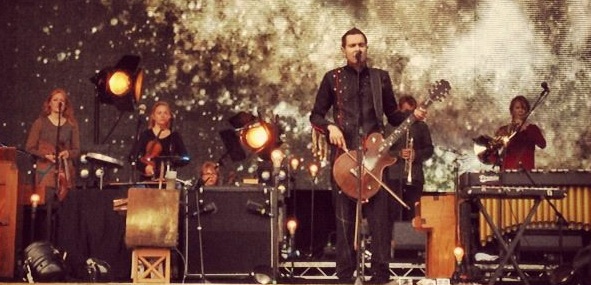 FOR THOSE WHO consider Captain Beefheart (known to his mother as Don Van Vliet) an important glitch in rock history, then the delayed release of Bat Chain Puller 36 years after its recording will be as important as the reconstituted Smile was to fans of the Beach Boys.
FOR THOSE WHO consider Captain Beefheart (known to his mother as Don Van Vliet) an important glitch in rock history, then the delayed release of Bat Chain Puller 36 years after its recording will be as important as the reconstituted Smile was to fans of the Beach Boys.
Although it’s been convenient for the critical establishment to deign the 1969 album Trout Mask Replica the one and only truly great Captain Beefheart work, it turns out that – while TMR was certainly a colossal piece that impacted on future rock history in innumerable ways – many of Beefheart’s other albums are pretty incredible, too, and rather more listenable.
By 1976, Beefheart had almost disappeared off the scene after a disastrous foray with the commercial rock world. His old school buddy Frank Zappa helped him get it together to record what became Bat Chain Puller, which would see the Captain (together with the latest recruits in his Magic Band) formulate a sound that combined the insane dada blues of his earlier years with a somewhat less avant garde approach.
 Unfortunately, when Zappa’s then manager absconded with the master tapes, the album became snared in a long-running litigation. Ironically, it wasn’t until Don Van Vliet’s death in 2010 (as a result of multiple sclerosis) that the way was finally clear for the Zappa family trust to issue the album.
Unfortunately, when Zappa’s then manager absconded with the master tapes, the album became snared in a long-running litigation. Ironically, it wasn’t until Don Van Vliet’s death in 2010 (as a result of multiple sclerosis) that the way was finally clear for the Zappa family trust to issue the album.
What complicates matters is that – again like the case of the Beach Boys’ Smile – re-recordings of most of the songs from this project were subsequently released on what turned out to be his last three albums, many of them clustered on 1978’s Shiny Beast (Bat Chain Puller), and others inserted in the running order of Doc At The Radar Station (1980) and Ice Cream For Crow (1982). These were all fine albums, but the Captain was tired of the rock’n’roll circus and the financial limitations of being a bona fide cult artist, so he retired to paint, finally finding a real career.
Several pirated copies of Bat Chain Puller have appeared over the years, but sonically, they’re like black and white photocopies when the machine is in need of toner compared to the heft, width and guts of the original multi-tracks, which have been mastered with 2012 technology.
The title track, which starts proceedings, is an object lesson in what made Beefheart so great in the latter part of his artistic life. Where his early albums displayed the full multi-octave range of his amazing holler of a voice, by now he’d jettisoned most of the lower register to concentrate on a wiry Howlin’ Wolf meets Donald Duck delivery pumped out at maximum velocity. It’s the same voice he used on 1967’s ‘Electricity’; the one that was so powerful it ruptured the very expensive recording microphones. It’s an incredible voice, and an incredible song with its oddball rhythms apparently derived from the arrhythmic pumping of Vliet’s windscreen wipers. Like many of his later songs, they’re also poetry recitals, although the combined impact of the music and vocals is so intense that this facet only struck me recently. And I’m not even going to start on those lyrics, but try this for size: “Bat chain puller/Puller puller… Bulbs shoot from its snoot/And vanish into darkness/It whistles like a root snatched from dry earth/Sodbustin’ rakes with grey dust claws/Announces its coming in the morning/This train with grey tubes/That houses people’s very thoughts and belongings.”
 There are several tracks on Bat Chain Puller that are simply lyric recitals, and one of them is the second track, ‘Seam Crooked Sam’, featuring just voice, guitar and piano. Ditto ’81 Poop Hatch’ and ‘Odd Jobs’.
There are several tracks on Bat Chain Puller that are simply lyric recitals, and one of them is the second track, ‘Seam Crooked Sam’, featuring just voice, guitar and piano. Ditto ’81 Poop Hatch’ and ‘Odd Jobs’.
But one defining characteristic of both this original Bat Chain Puller and its faux re-recording Shiny Beast is the eclecticism of styles, and it works. The third track, ‘Harry Irene’, is unlike any other Beefheart track, being a melodic little beast that tells the story of a lesbian couple who “ran a canteen”, and features extended whistling towards the end. It’s just plain weird hearing Beefheart crooning like a singer, but it works, and it’s utterly charming.
There are also several brilliant instrumentals, the short guitar piece ‘Flavor Bud Living’ and the tack-piano dominated ‘Ah Carrot Is As Close As Ah Rabbit Gets To Ah Diamond.’
The album peaks, however, with a clutch of tracks starting with the mind-bending desperation of ‘Brickbats’, where the Captain’s full-throttle vocal is simply awesome, along with its splurting sax and Trout Mask-style anti-guitars. ‘Floppy Boot Stomp’ is the good Captain getting into the funky voodoo, brilliantly, and not dissimilarly to the better tracks on early ‘70s albums The Spotlight Kid and Clear Spot. ‘Owed T’Alex’ is also somewhat splendid, with Vliet’s atonal harmonica, cool guitar counterpoint and a desert blues vibe. Finally, there’s the incredible ‘Human Totem Pole (The 1000th And 10th Day Of The Human Totem Pole)’, a concept that would have done William Burroughs proud, had he had a moral compass.
The album has several bonus cuts, including a rather rambling eight minute jam, and the whole thing sounds freshly minted and free of unnecessary compression.
I have to admit, though, that this isn’t quite the great lost Captain Beefheart album I had been hoping for. With so many (re-recorded) duplications on later albums, there’s less of a surprise factor than I had expected, and mostly, I slightly preferred the re-recordings. Why? On the later Shiny Beast, Beefheart was able to call on slide guitarist Jeff Moris Tepper as well as experienced studio musicians like Bruce Fowler (trombone), Robert Williams (drums) and, most importantly, Eric Drew Feldman (synth, piano, bass). Feldman’s contributions to the sound were immense, and in their second incarnation these songs seemed finished; the versions of Bat Chain Puller, on the other hand, sound a little tentative and raw by comparison, although I’m sure there will be those who think them more spontaneous and lifelike. Also, erratic sequencing means the album doesn’t flow as well as Shiny Beast or the later, even better, Doc At The Radar Station.
Essential for Captain Beefheart fans, then, and a reasonable entry point for initiates to the wonderful world of Don Van Vliet, without really adding substantively much to the existent discography. GARY STEEL
Sound = 4/5
Music = 4
















A late thanks to this good review of a splendid release, on which I can only now react, because I bought a very well sounding bootleg release of this without the superfluous bonus material and on vinyl (I never got on the cd train, and stay very happy with that, even if it means missing out on some records, less is often more). You can guess that I also mean to differ with you on some points. I think the elpee I got has a better flow than Shiny Beast, because on side one we get the mixing of styles, even lounge jazz, then Brickbat throws us into the pit, side two builds up to the climax of Oddjobs and () Human Totem Pole. The singing here is also better, fuller, then on the later great trilogy. And to conclude, the later trilogy has superb musicians, but the playing on Bat Chain Puller is just a bit more infused with the Beefheart spirit to my ears, without frills, primitive yet complex. Still, I would not want to miss the later trilogy…